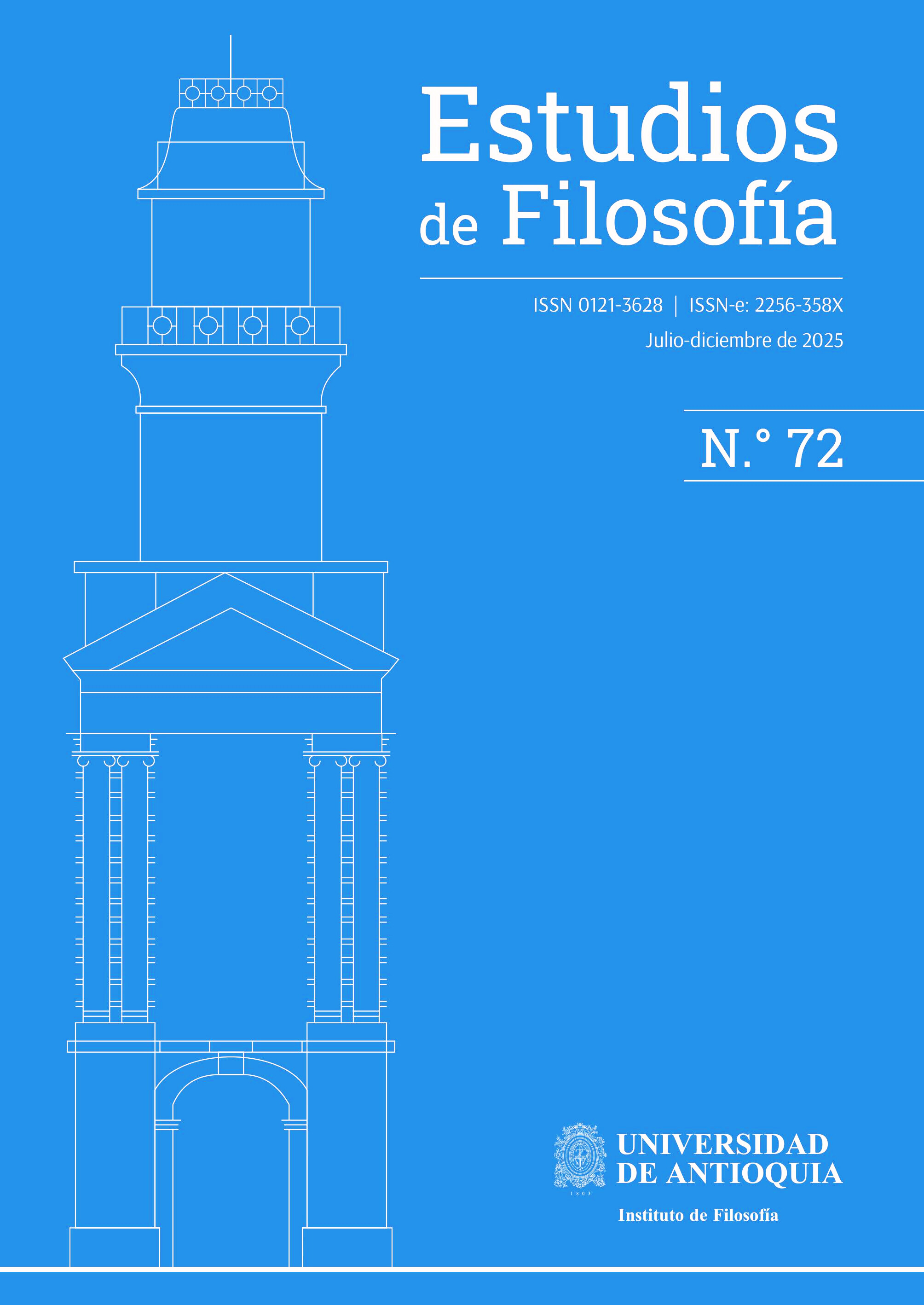A discussion with Pablo Melogno on Kuhn’s semantic commitments: an inflationary or deflationary interpretation?
DOI:
https://doi.org/10.17533/udea.ef.356659Keywords:
Pablo Melogno, Prescriptive Theories of Meaning, Cluster Descriptive Theory, Meaning, ReferentAbstract
Pablo Melogno's thought has profoundly influenced scholars of Kuhnian philosophy in Latin America, thanks to his meticulous archaeological analysis of Kuhn's unpublished works. From this analysis, he aims to unveil the semantic commitments of the author of The Structure of Scientific Revolutions. Among the abundant literature that Melogno leaves us as an intellectual legacy, one work stands out not only for its rigor but also for the provocative nature of its arguments. I refer to “Towards a Genealogy of Thomas Kuhn’s Semantics” (2023), co-authored with Giri. In this work, the authors argue that Kuhn, in his early texts, defends a semantic commitment to the descriptive theory of the cluster. Since I believe this is an inflationary interpretation, in this article I will propose a deflationary interpretation. I argue that, while Kuhn may have anticipated some of the claims of the cluster theory, the true purpose of the Lowell Lectures has a destructive semantic character, focusing on formal—or prescriptive—theories of meaning.
Downloads
References
Boersema, D. B. (1988). Is the Descriptivist/Cluster theory of reference “wrong from the fundamentals?”. Philosophy Research Archives, XIV, 517-538. https://doi.org/10.5840/pra1988/19891422
Davidson, D. (2001). Subjective, Intersubjective, Objective. University of California. https://doi.org/10.1093/0198237537.001.0001
Devitt, M. (1996). Realism and Truth. Princeton University Press.
Frege, G. (1892). Über Sinn und Bedeutung. Zeitschrift für Philosophie und philosophische Kritik, 100, 25–50.
Flórez, D. (2021). La tesis de la inconmensurabilidad de teorías: desafíos e implicaciones. Universidad de Caldas.
Kuhn, T. (1977). Second Thoughts on Paradigms. En F. Suppe (Ed.), The Structure of Scientific Theories (pp. 459-482). University of Illinois Press.
Kuhn, T. (1980). The Natures of Conceptual Change. University of Notre Dame.
Kuhn, T. (1984). Desarrollo científico y cambio de léxico (L. Giri, trad.). Facultad de Información y Comunicación, Universidad de la República y Sociedad Argentina de Análisis Filosófico.
Kuhn, T. (2000a). Theory Change as Structure Change: Comments on the Sneed formalism. En The Road since Structure (pp. 176-195). The University of Chicago Press.
Kuhn, T. (2000b). Commensurability, Comparability, Communicability. En The Road since Structure (pp. 33-57). The University of Chicago Press.
Kuhn, T. (2016). The Structure of Scientific Revolutions. The University of Chicago Press.
Kuhn, T. (2021). The Quest for Physical Theory: Problems in the Methodology of Scientific Research. Lowell Lectures (G. Reisch, ed.). The MIT Libraries. https://hdl.handle.net/1721.3/189338
Marcum, J. A. (2015). Thomas Kuhn’s Revolutions: A historical and Evolutionary Philosophy of Science? Bloomsbury Publishing Plc.
Melogno, P., & Giri, L. (2023). Towards a Genealogy of Thomas Kuhn’s Semantics. Perspectives on Science 2023, 31(4), 385-404. https://doi.org/10.1162/posc_a_00591
Melogno, P. (2023). A Vindication of Structure in Structure of Scientific Revolutions: A Comment to K. Brad Wray. En L. Giri, P. Melogno & H. Miguel (eds.), Perspectives on Kuhn: Contemporary Approaches to the Philosophy of Thomas Kuhn (pp. 41-51). Springer. https://doi.org/10.1007/978-3-031-16371-5_4
Rorty, R. (1992). The Linguistic Turn: Essays in philosophical method. University of Chicago Press.
Russell, B. (1905). On Denoting. Mind, 14(56), 479-493. https://doi.org/10.1093/mind/XIV.4.479
Searle, J. (1958). Proper Names. Mind, 67(266), 166-173. https://doi.org/10.1093/mind/LXVII.266.166
Searle, J. (1969). Speech Acts: An essay in the Philosophy of Language. Cambridge University Press. https://doi.org/10.1017/CBO9781139173438
Strawson, P. F. (1950). On referring. Mind, 59(235), 320-344. https://doi.org/10.1093/mind/LIX.235.320
Wittgenstein, L. (1953). Philosophical Investigations (G. E. M. Anscombe, trad.). Wiley-Blackwell.
Downloads
Published
How to Cite
Issue
Section
Categories
License
Copyright (c) 2024 Daian Tatiana Florez Quintero

This work is licensed under a Creative Commons Attribution-NonCommercial-ShareAlike 4.0 International License.
Authors who publish with this journal agree to the following terms:
1. The Author retains copyright in the Work, where the term "Work" shall include all digital objects that may result in subsequent electronic publication or distribution.
2. Upon acceptance of the Work, the author shall grant to the Publisher the right of first publication of the Work.
3. The Author shall grant to the Publisher a nonexclusive perpetual right and license to publish, archive, and make accessible the Work in whole or in part in all forms of media now or hereafter known under a Creative Commons Attribution-NoCommercia-ShareAlike (CC BY-NC-SA 4.0), or its equivalent, which, for the avoidance of doubt, allows others to copy, distribute, and transmit the Work under the following conditions: (a) Attribution: Other users must attribute the Work in the manner specified by the author as indicated on the journal Web site;(b) Noncommercial: Other users (including Publisher) may not use this Work for commercial purposes;
4. The Author is able to enter into separate, additional contractual arrangements for the nonexclusive distribution of the journal's published version of the Work (e.g., post it to an institutional repository or publish it in a book), as long as there is provided in the document an acknowledgement of its initial publication in this journal;
5. Authors are permitted, and Estudios de Filosofía promotes, to post online the preprint manuscript of the Work in institutional repositories or on their Websites prior to and during the submission process, as it can lead to productive exchanges, as well as earlier and greater citation of published work (see The Effect of Open Access). Any such posting made before acceptance and publication of the Work is expected be updated upon publication to include a reference to the Estudios de Filosofía's assigned URL to the Article and its final published version in Estudios de Filosofía.















